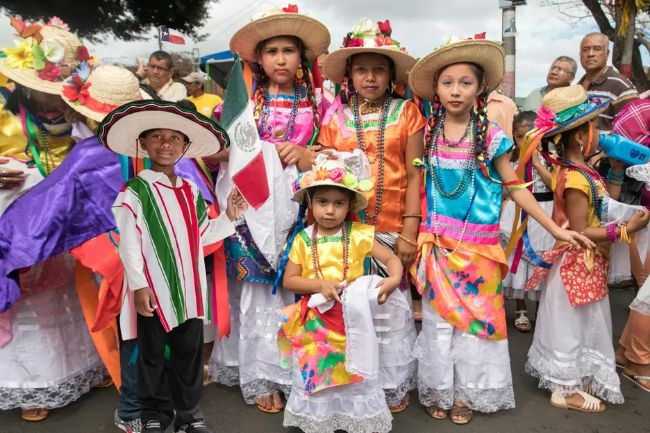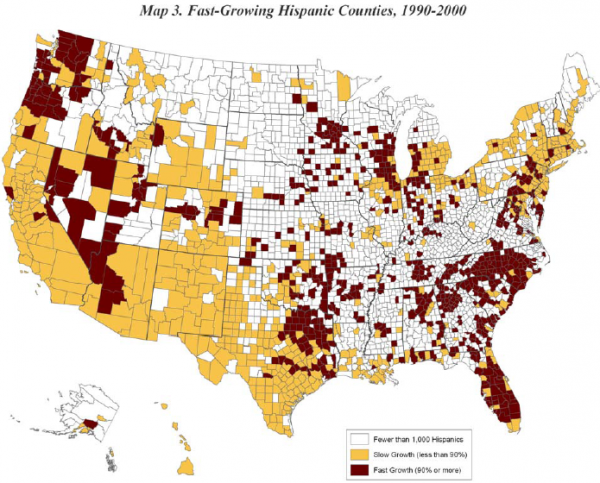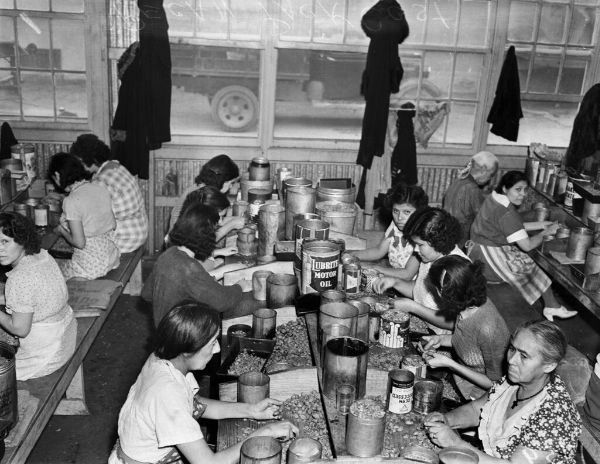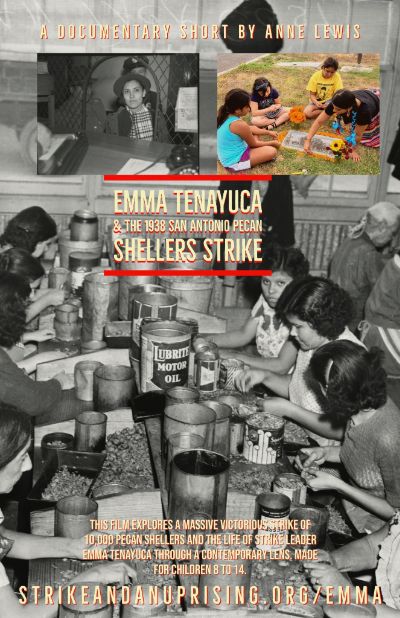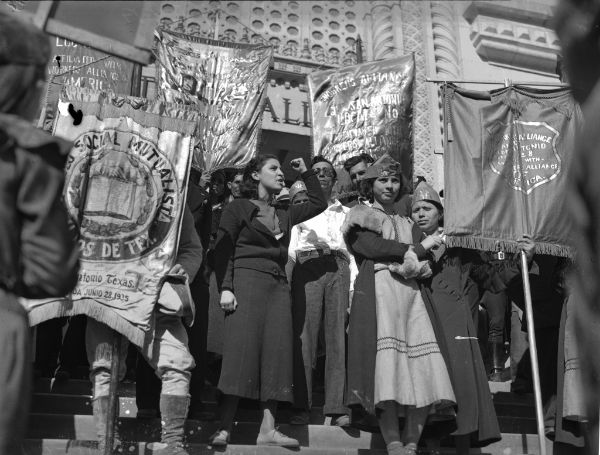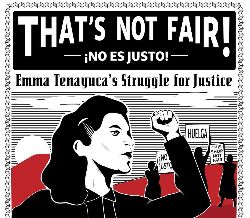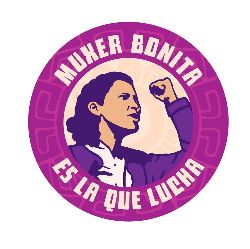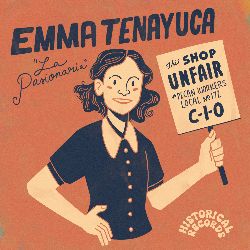|
|
The weekly newsletter of the Mexico Solidarity Project |
|
Every issue archived online at mexicosolidarityproject.org/archives/ |
|
May 07, 2025 |
|
|
|
Texas Pride, Tejas Mexico Style |
|
Meizhu Lui, for the editorial team |
|
|
Cinco de Mayo celebration in Abilene, Texas: Photo: Rubly Fearless Fernandez/Canva |
|
If Trump wants to call the Gulf of Mexico the Gulf of America, we should rename Texas. It should be called Mexican Texas, or Tejas Mexico. After all, “Texas” is based on the Spanish Tejas, the territory's name since the 17th century.
Mexican Texas was a province of Mexico after independence. But that didn’t last long. When slavery was outlawed in Mexico, Anglo-American settlers wanting to own slaves rose up and seceded. The Republic of Texas was founded in 1836, and they wrote a constitution protecting the slave system. The racist origins of Texas are alive and well today, as that state institutes some of the most cruel and extreme measures against immigrants from Mexico.
But Mexican Americans refuse to give up their culture, refuse to forget their proud past. After all, it was the brilliant General Ignacio Zaragoza, born in Mexican Texas, who on May 5, 1862, led the ragtag Mexican army to victory against the French invaders who had the greatest army in the world at that time. In the battle of Puebla, Zaragoza lost only 90 men compared to 1,000 Frenchmen.
Shortly after France was defeated, Texas Mexicans began commemorating the victory scored by one of their own, General Zaragoza. From 1867 up to the present, Cinco de Mayo is celebrated all across Texas, from big cities to rural towns. Traditional music, dance and food is shared — including with the descendants of the Anglos who defeated Mexico. For a day, Texans experience the generosity of friendship and the enchantment of a multicultural space.
US Texas is known for “Texas pride,” a macho, go-it-alone, white culture. In today’s interview, Anne Lewis tells us abut another courageous Mexican American fighter, Emma Tenayuca, who led a ragtag uprising of workers against the great power of US business interests, a woman who made and makes her community proud. It’s the alternative “Texas pride,” the pride of Tejas, Mexico.
|
|
|
Pecans and Protest: a Texas Story |
|
In today’s issue, we post an updated version of a previous interview with filmmaker Anne Lewis about her film on the historic Texas pecan strike and its leader Emma Tenayuca. |
|
Anne Lewis comes out of a movement to make media that create opportunities for social change. Documenting the lives and struggles of working people, particularly in Appalachia, her award-winning films illuminate their grit, courage, and creativity. Lewis brings to the foreground the stories of those usually in the background. Descriptions of her many films appear on her annelewis.org website. |
|
|
Your film, "A Strike and an Uprising! (in Texas)," explores the 1938 Mexicana pecan workers strike and its leader, the 22-year-old Emma Tenayuca. What sparked your interest in this story? |
|
|
Fast-growing Hispanic Communities, 1990s: Pew Research Center |
|
Anne Lewis: As a rebellious 18-year-old, I fled to Mexico, where I first recognized — in a very different part of the continent — the vitality of rural communities. Later, I was living in rural Appalachia, where, in the early 90s, Mexican workers began showing up in large numbers to work on corporate farms and in small factories. |
|
At the same time, factory work was shifting to the maquiladora area of Mexico. People from the Highlander Center and the labor community, including me, were concerned about the potential for violence. We organized trips of US workers to Mexico to see what had happened to their jobs. We wanted to explore what’s possible in terms of international solidarity. That resulted in the film “Morristown: in the air and sun,” a working-class critique of globalization that ended with a union factory at a chicken-processing plant in East Tennessee.
When I moved to Texas, a union sister told me about the pecan workers’ strike in 1938 which involved 10,000 workers, many undocumented. My work partner Laura Varela and I went to Senior Centers to find workers who had been part of the strike.
What situation did the pecan workers face? |
|
As one of the former pecan workers told me, “Pecans are good to eat but, they are hard to shell.” Other shelling companies had mechanized, but the Southern Pecan Company found that people were cheaper than machines. |
|
|
Photo: courtesy of Anne Lewis |
|
The struggle was centered on the west side of San Antonio where Mexican and Mexican American women, elderly men and children as young as ten labored in shelling shacks or at home at all hours of the day and night. The workers made 6 cents a pound. But then the company slashed the wage to 4 cents with no warning. At least 10,000 workers went out on strike. They were organized by the CIO cannery workers union, UCAPAWA, one of the few unions to organize black and brown women in the country. |
|
|
Emma Tenayuca, 1938, the year Emma led striking Mexicana pecan shellers |
|
Their struggle became more than a strike. It was an uprising of a people, coming from community outrage at the discrimination and super exploitation these workers were facing. The Chief of Police said that he was trying to stop a “revolution.” |
|
Was Emma Tenayuca a pecan worker? |
|
No. Her grandfather had taken her to hear speeches by veterans of the 1910 Mexican Revolution, including communists and anarchists. The spark caught fire in her. She joined striking women cigar workers at the age of 16, and the violent repression of those strikers, including her own arrest, solidified her resolve to stand with workers. She joined LULAC, the League of United Latin American Citizens, but quit because they excluded immigrants. Emma’s family had been in the US for many generations, but she saw Mexicans and Mexican Americans all as Mexicanos/as, regardless of which side of the border they came from.
Emma joined the Communist Party in 1937 and was part of the united front, organizing Mexican workers into Unemployed Councils. She became well-known, beloved even, for her fiery speeches and uncompromising defense of working people. |
|
|
Poster for Emma Tenayuca and the 1938 Pecan Shellers Strike, a film by Anne Lewis |
|
|
Workers Alliance leader Emma Tenayuca speaking to crowd outside San Antonio City Hall, March 8, 1937. Courtesy, UTSA Special Collections. |
|
Based on that reputation, the pecan workers elected her to be the spokesperson for their strike. She was all of 22!
Striking workers were beaten, harassed, and tear-gassed. Emma herself was jailed several times. Later, people would ask her if she had been afraid. Her answer: “I never thought in terms of fear. I thought in terms of justice.” |
|
After more than a month of violence, Texas Governor Allred pressured the companies and the union to enter arbitration, which finally produced a pay increase for the workers. The strike became a landmark case for both the rights of women and Mexican workers. Along with similar labor strikes, it influenced the passing of the Fair Labor Relations Act of 1938 and the first minimum wage laws.
Emma had three strikes against her: a woman, a Mexicana, and a Communist. How did those identifications affect her?
During the Depression years of the 1930s, Mexican workers took much of the blame for US unemployment. Deportations soared. |
|
In that political moment and with women becoming directly involved in struggle, the white patriarchs of industry, the Catholic Church, the police and most of San Antonio’s political officials united against Emma.
Tenayuca’s Communist Party affiliation would finally lead to her getting run out of San Antonio. |
|
|
Emma Tenayuca in Bexar County Jail, June 29, 1937. Courtesy, UTSA Special Collections. |
|
Blacklisted, physically and spiritually exhausted, she left Texas for San Francisco, where she became a teacher. She didn’t return to Texas for more than 20 years.
When she returned, people expected her to take her position again as a radical firebrand — but she didn’t.
On the one hand, some put Emma on a pedestal as a labor saint. On the other, some criticize her for ending her political activism after leaving San Antonio. But Emma was a woman, a real human being. She had a right to live her own life, rather than fulfilling the expectations of others. Isn’t that what it means to be liberated and in control of your own life?
What impact did Emma have on other women?
Today, Emma is being reclaimed by women, particularly the women of San Antonio. Her image appears on murals, fist in the air. When we made the film, mostly only veterans of the strikes of the 1930s remembered her fondly. But Emma has become an inspiration once again to an entire new generation of women activists. |
|
|
No Es Justo! Carmen Tafolla, Sharyll Tenayuca, and Terry Ybanez wrote and illustrated the original children’s book. |
|
|
Button designed by Melanie Cervantes |
|
|
Art by Camilla Franklin, Mandy Gonzalez performs a brand new hip-hop track about tbe pioneering labor activist. |
|
|
|
|
Our Hearts Sing Freedom: La Gloria de Cinco de Mayo |
|
|
Bill Gallegos, a veteran Chicano liberation activist, environmental justice leader, and revolutionary socialist, has a lot to howl about. Many also know Bill for his poetry and political essays. Gallegos is a member of the editorial board of The Nation. |
|
|
Cada Cinco de Mayo … Brown hands hurriedly cutting/
backs bent/skin scorched/dignity resting lightly on shovel.
El Aguila/flowing in an arc de Resistencia –
piercing the seamless skies of Aztlán.
We are not the spoils of conquest/not meant to be chained/
our bodies broken for CoolRay tycoons, drinking our life’s blood/
on the fringes of ClubMed.
We are the children of Cuauhtémoc/
creators of awe and wonder/visionaries/life givers …
desert artists singing sacred song.
You cannot defeat us – racists with bibles and guns!
También, we are the children of Puebla/souls fired like
diamonds struck hard by the oppressive hands of decay/and a greed
untouched by the tender stroke of humanity.
You cannot defeat us/our veins run with the blood
of struggle/and a blessed fire. Our hearts sing
a freedom song/even in the deathly cold and silence of your prisons.
Simón!! We are the children of Zaragoza, of Juárez, and Villa,
of Zapata, Flores-Magón and Tenayuca/… soldados valientes de Cortina/
We are Mano Negra and Brown Berets/Mothers of East LA Streets.
We are your worst nightmare – the true Calawala cabrónes.
For reals - we are the true Sueño de Las Americas. |
|
Don’t miss an issue! Sign up for a free Mexico Solidarity Bulletin subscription.
For a deeper dive into current news and analysis in English, check out our media website and the podcast ¡Soberanía! (Sovereignty) with José Luis Granados Ceja and Kurt Hackbarth. Sin Muros is a weekly program dedicated to analyzing the Mexico-US relationship, reporting news, analysis and research from both sides of the border.
And those of you with mad skills and/or interests we want to hear from you! Get in touch to find ways to plug in to the work. Drop a line to meizhului@gmail.com. |
|
|
Recent news reports and commentaries, from progressive and mainstream media, |
|
Timothy A. Wise, Mexico’s enacts constitutional ban on cultivation of genetically modified corn. While GM corn has faced planting restrictions for more than a decade, the constitutional ban represents an important act of resistance and sovereignty, particularly in light of the flawed decision by a USMCA tribunal.
Vanessa Romero Rocha, 40 horas: un gobierno de izquierda El País. Dentro de los acuerdos habrá que prever asuntos no menores: cómo garantizar que las horas extras —esas que deberían ser pagadas al doble— efectivamente se cubran, qué parte de ellas serán bendecidas con exención impositiva y con qué sectores se empezará. Inserte aquí la advertencia del diablo y su morada en los detalles.
Michael D. Yates, The Trump Tariffs and the U.S. Labor Movement Monthly Review Online. That labor leaders would praise anything Trump does is unacceptable. It illustrates a nationalism that should be vigorously opposed by labor in the nations of the Global North. It is nothing but a “beggar your neighbor” strategy, which is a slap in the face to labor organizations in Mexico, for example, who actively supported UAW strikes.
Jorge Zepeda Patterson, La importancia de llamarse Ernesto Milenio. La crítica a la visión de país del modelo neoliberal pasa por exhibir las incongruencias de quienes construyeron ese orden y la falacia de sus argumentos. Mostrar las incongruencias de Ernesto Zedillo no es sólo cuestionar el valor moral del portador del mensaje, es también demoler el mensaje mismo.
Marilyn La Jeunesse, The Real History of Las Soldaderas, the Women Who Made the Mexican Revolution Possible Teen Vogue. Today, Las Soldaderas’ contributions to the Revolution are finally being recognized for what they were: an integral part of creating Mexico’s future and forging a path toward equality among men and women, throughout the country. María del Pilar Martínez, México, después de seis años, va de regreso al viejo modelo laboral El Economista. Una mirada más crítica sobre los lentos avances en las relaciones laborales bajo la 4T.
José de Córdoba & Santiago Pérez Trump, Mexico’s Sheinbaum Spar Over Drug Cartels Wall Street Journal. Tense call between presidents shows how discussion of U.S. military action in Mexico has strained relations.
Tensión EU-México: WSJ Sin Embargo. La llamada entre la Presidenta Claudia Sheinbaum y Donald Trump habría sido tensa, luego de que el republicano presionará a Sheinbaum para permitir una mayor participación de tropas estadounidenses en México, afirma WSJ.
Ex-CIA Operative Exploited Diplomatic Immunity to Sexually Assault Women in Mexico, Documents Reveal Telesur English. Newly released U.S. Department of Justice documents expose how Brian Jeffrey Raymond, a former CIA collaborator and U.S. diplomat, used his official status to drug and assault at least 28 women across Mexico and other countries.
El apagón previsible Sin Embargo. AMLO alertó que las eléctricas lo harían. No pasó acá en México, pero sí en España. |
|
|
|
|
The Mexico Solidarity Project brings together activists from various socialist and left organizations and individuals committed to worker and global justice. We see the 2018 election of Andrés Manuel López Obrador as president of Mexico as a watershed moment. AMLO and his progressive Morena party aim to end generations of corruption, impoverishment, and subservience to US interests. Our Project supports not just Morena, but all Mexicans struggling for basic rights, and opposes US efforts to undermine organizing and Mexico’s national sovereignty.
Editorial committee: Meizhu Lui, Bruce Hobson, Agatha Hinman, Victoria Hamlin, Courtney Childs, Pedro Gellert. To give feedback or get involved yourself, please email us! |
|
Subscribe! Get the Mexico Solidarity Bulletin in your email box every week. |
|
Web page and application support for the Mexico Solidarity Project from NOVA Web Development, a democratically run, worker-owned and operated cooperative focused on developing free software tools for progressive organizations. |

